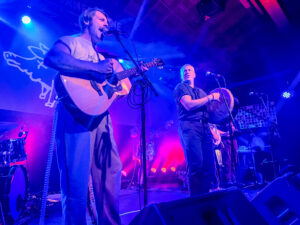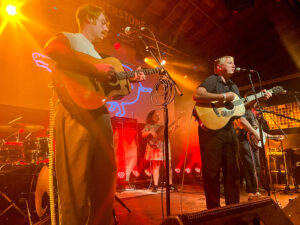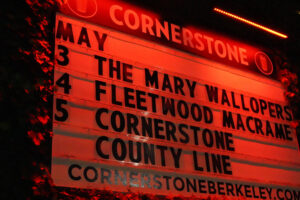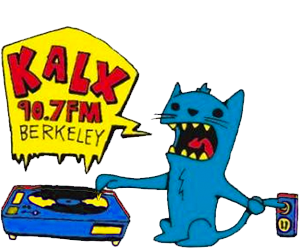Photos and Review by Hannah Rohret.
The Mary Wallopers rocked Berkeley’s Cornerstone last Friday, delivering a raucous finale to their North American tour. Hailing from Dundalk, Ireland, this anti-imperialist band of ballad singers drew throngs of concert-goers, all eager to revel in the unapologetic, working-class glory of their music, deeply rooted in Irish resistance and folk tradition. With calls for a Free Palestine woven into their set from start to finish, they certainly did not disappoint. The Mary Wallopers embody a music of the people, by the people, reclaiming folk music’s radical heritage and fostering a profound sense of pride and solidarity among the masses
From their origins as a trio in a quarantine-era, makeshift pub, live streamed in their series Stay at Home With The Mary Wallopers, featuring multi-instrumentalist brothers Charles (guitar, bodhrán, vocals) and Andrew Hendy (banjo, guitar, vocals) alongside their good pal Seán McKenna (guitar, vocals), The Mary Wallopers have expanded into a dynamic six-piece ensemble. Róisín Barrett lays down a chilled vibe on the bass, the talented Finnian O’Connor on the cherished tin whistle and Uilleann pipes. And of course, there’s the commanding presence of Ken Mooney on the drums, delivering powerful beats that drive their sound forward.
The whole cast was present Friday night in Berkeley as they wrapped up their second North American tour this year, and the packed venue pulsated with mosh pits, crowd surfing and spirited banter as the band played songs from their new album, Irish Rock N Roll, including their humorous and light-hearted tune, “The Blarney Stone,” and the bodhrán-driven, working-class anthem “Rich Man and the Poor Man,” along with hits from their 2022 self-eponymous album, such as crowd favorites, “Eileen Óg” and “Cod Liver Oil and The Orange Juice.”
Charles set the tone for the evening with his characteristic air of mischief, dry humor and joy, opening the festivities with the familiar Irish greeting, “What’s the fuckin’ craic, Berkeley?” The audience immediately sensed they were in for a night to remember and, as the night unfolded, the atmosphere only heightened with the spirited performance of the song “Rothesay-O” and Charles’ infamous yet affectionate declaration that “Seán McKenna is a dirty lout,” prompting a moment of uproarious laughter and cheers from the crowd. 
Midway through the show, each of the founding three members got their time to captivate the audience as they stood alone on stage, slowing things down. Charles Hendy performed Dominic Beham’s “Building Up and Tearing England Down,” a classic ballad that gives voice to the forgotten Irish immigrant laborers essential to building Britain’s infrastructure. His brother Andrew performed an unaccompanied rendition of “Do Me Justice,” which speaks to the historically unfair representation and anti-Irish sentiment in the media. The ballad, as noted by Hendy, seamlessly symbolizes the unfair treatment and villainization of all ethnic groups in the media today, notably that of the Palestinian people. Meanwhile, Seán McKenna shined bright with his vocals and guitar playing on “The Idler” and “Love Will Never Conquer Me,” and the group rounded out the show with their high-energy, debaucherous party anthem, “All For Me Grog,” after announcing they would be performing the next day at the UC Berkeley encampment in solidarity with the Palestinian people and Pro-Palestinian activists.
What draws people to The Mary Wallopers is not just their incredible musicianship and charisma, but their unwavering commitment to the anti-colonialist and anti-capitalist ideology that runs deep throughout Folk, Punk and Irish tradition. Their total rejection of any hierarchical barriers between them and their fans provides a sense of solidarity and accessibility to their music that many bands rarely achieve. The storytelling and themes woven throughout their music gives us something to celebrate and be proud of as working class people, and allows the listener to connect in a way that helps them cope with everyday life. As explained by Andrew Hendy in a 2022 interview with The Guardian, “People who need these songs the most should be able to connect to it easily. If people listen to us and feel like, ‘Oh, I could never do that,’ then there’s something wrong.”


